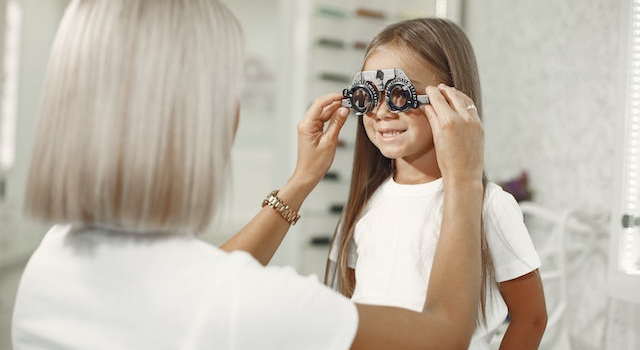
Vision screenings in schools are designed to identify visual impairments in children, which could impact their learning and development. These screenings are usually brief and involve simple tests to check for common issues like nearsightedness (myopia) or farsightedness (hyperopia). However, while they serve an important purpose, they are not a substitute for comprehensive eye exams.
As the back-to-school season gets underway, it’s important that we, as parents, stay alert for potential eye conditions in our children to address any vision-related issues that may affect their school performance.
What Do School Vision Screenings Typically Include?
School vision screenings generally involve basic tests like visual acuity assessments, where children are asked to read letters on a chart from a distance. They may also include color vision tests and simple eye alignment checks. These screenings are efficient for detecting general visual problems but often fail to identify more subtle issues that could affect a child's learning and overall eye health.
Limitations of Vision Screenings at School
Lack of Depth: Screenings typically do not test for all aspects of vision, such as depth perception, peripheral vision, or eye coordination. Issues in these areas can significantly affect academic performance and everyday activities.
Not Diagnostic: Screenings are not diagnostic tests. They can indicate a potential issue but cannot provide a definitive diagnosis or detailed understanding of a child’s eye health.
Miss Subtle Issues: More complex conditions like astigmatism, binocular vision disorders, and early signs of eye diseases are often missed during these screenings.
Moreover, while school vision screenings are a valuable tool used to identify children who need further evaluation, they cannot be considered sufficient for ensuring complete eye health. Here are some common issues that may be overlooked during school screenings:
- Unidentified Refractive Errors
Refractive errors like myopia, hyperopia, and astigmatism can sometimes be subtle and missed in a school screening. A child may have difficulty seeing the board or reading without anyone realizing there is a problem.
- Binocular Vision Disorders
Conditions like strabismus (misaligned eyes) or amblyopia (lazy eye) require comprehensive exams to diagnose and treat effectively. These conditions can affect a child’s ability to focus and process visual information properly.
- Early Signs of Eye Diseases
Conditions such as glaucoma or cataracts are rare in children but can occur and often show no symptoms in the early stages. Only a comprehensive eye exam can detect these conditions early and ensure timely treatment.
Why Comprehensive Eye Exams Are Essential
Unlike school screenings, comprehensive eye exams conducted by a qualified optometrist or ophthalmologist involve a detailed assessment of all aspects of vision and eye health. These are crucial for diagnosing conditions that can be easily missed by school screenings.
Components of a Comprehensive Eye Exam
- Detailed Medical History: Understanding a child's overall health, family history of eye conditions, and any symptoms they may be experiencing.
- Visual Acuity Tests: More detailed tests than those performed in school screenings to assess clarity of vision.
- Refraction Test: Determines the exact prescription for glasses or contact lenses.
- Binocular Vision Tests: Assess how well the eyes work together and detect any alignment issues or coordination problems.
- Eye Health Evaluation: Examines the health of the eye itself, including checking for signs of diseases or conditions that may not show symptoms in early stages.
Request an Eye Exam Appointment for Your Child
Given the limitations of school vision screenings, parents need to schedule regular comprehensive eye exams for their children. These exams provide a complete evaluation of eye health and vision, guaranteeing that any issues are identified and treated early. At [token’s name=’practice’], we emphasize the importance of these exams and are dedicated to providing the highest standard of eye care for children and adults alike.
To ensure your child's vision health is fully supported, request an appointment with . Our team of experienced eye care professionals is committed to delivering comprehensive eye exams and personalized care to meet your child's needs. Request your child’s next appointment today.
